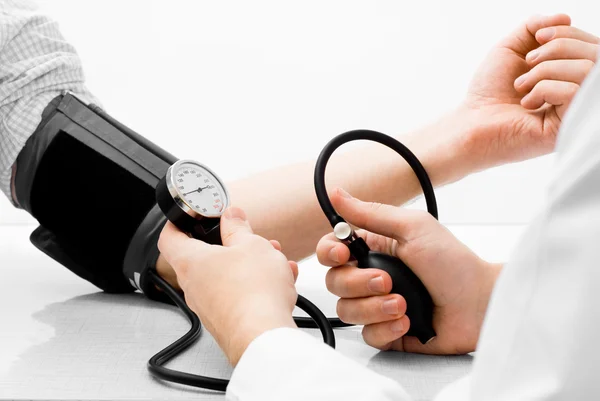






Are you tracking your blood pressure numbers often enough? If your blood pressure has been climbing, you might consider checking more frequently. The easiest way to do this is by finding the right home blood pressure monitor for you. There are many available, so it’s important to know which one is ideal for you! Here’s a quick guide to finding the right electronic home blood pressure cuff.
Electronic home blood pressure monitors are useless if people cannot see their results! A large easy-to-read digital display is essential. One that can compare results to the World Health Organization standards for blood pressure is most ideal. A memory recall function allows people to show the doctor how their blood pressure trends over a given period of time. Electronic monitors that check for irregular heartbeats can help identify heart problems before people feel any symptoms.
Blood pressure monitors with arm cuffs are often recommended for people who are over the age of 50 or have a history of hypertension. Upper arm cuffs are available in a variety of sizes because a cuff that is too large will give false low readings. The American Heart Association suggests using your arm circumference to determine the correct cuff size:
| Arm Circumference | Recommended Cuff Size |
| 8.7” – 10.2” | 4.7” x 8.7” (small adult) |
| 10.6” – 13.4” | 6.3” x 11.8” (adult) |
| 13.8” – 17.3” | 6.3” x 14” (large adult) |
| 17.7” – 20.5” | 6.3” x 16.5” (extra-large adult) |
Checking blood pressure at home with an electronic monitor is a great way for people to take control of their health. HomeCare Hospital Beds is ready to help you do this with a variety of wrist and arm monitors. Always be sure to check with your doctor first and ask how to use the device correctly in order to get accurate results.
**The information on this site is not intended or implied to be a substitute for professional medical advice. If you are having a severe and sudden change in physical or mental health, please call 911, contact a local emergency facility or consult with your doctor. Always seek the advice of your physician or other qualified healthcare provider, and never disregard the advice given because of information you have received from our website.**




| Cookie | Duration | Description |
|---|---|---|
| cookielawinfo-checkbox-analytics | 11 months | This cookie is set by GDPR Cookie Consent plugin. The cookie is used to store the user consent for the cookies in the category "Analytics". |
| cookielawinfo-checkbox-functional | 11 months | The cookie is set by GDPR cookie consent to record the user consent for the cookies in the category "Functional". |
| cookielawinfo-checkbox-necessary | 11 months | This cookie is set by GDPR Cookie Consent plugin. The cookies is used to store the user consent for the cookies in the category "Necessary". |
| cookielawinfo-checkbox-others | 11 months | This cookie is set by GDPR Cookie Consent plugin. The cookie is used to store the user consent for the cookies in the category "Other. |
| cookielawinfo-checkbox-performance | 11 months | This cookie is set by GDPR Cookie Consent plugin. The cookie is used to store the user consent for the cookies in the category "Performance". |
| viewed_cookie_policy | 11 months | The cookie is set by the GDPR Cookie Consent plugin and is used to store whether or not user has consented to the use of cookies. It does not store any personal data. |